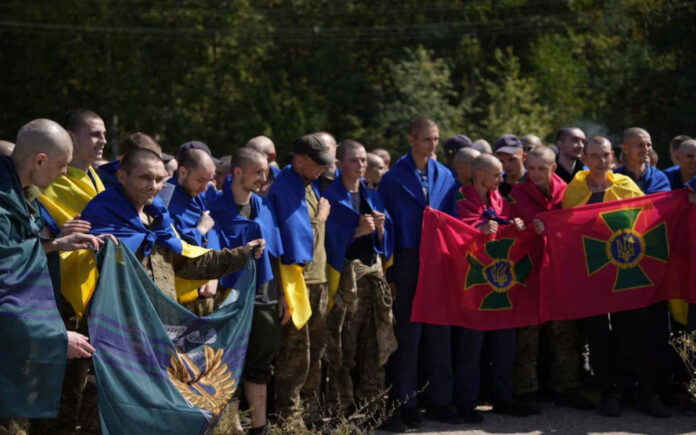Dubai/Moscow/Kyiv: Russia and Ukraine conducted a significant prisoner exchange on Saturday, with 115 prisoners of war being swapped from each side. The exchange was facilitated by the United Arab Emirates (UAE), marking the first such swap since Ukraine’s surprise attack in Russia’s Kursk region on August 6—the largest assault on Russian soil by a foreign power since World War Two.
The Russian Defense Ministry confirmed that the Russian soldiers exchanged were captured in the Kursk region. Upon their release, all Russian servicemen were transported to Belarus, where they will undergo medical treatment and rehabilitation before returning to Russia. The ministry expressed deep gratitude for the UAE’s role in brokering the exchange.
Ukrainian President Volodymyr Zelenskyy shared a photo of jubilant Ukrainian soldiers, wrapped in their national blue and yellow flags, celebrating their return. Zelenskyy noted that the released individuals included members of the border guards, national guard, navy, and armed forces. He also thanked the Ukrainian forces for capturing prisoners that made the swap possible.
Also Read | Israel Launches Strikes on Hezbollah in Lebanon, Citing Self-Defence
Ukraine has asserted that it created a buffer zone in an area frequently used by Russia to launch attacks on Ukrainian targets. Dmytro Lubinets, Ukraine’s commissioner for human rights, revealed that 82 of the returned Ukrainian POWs had defended the port city of Mariupol in 2022.
The UAE, which confirmed its mediation role, announced that the total number of captives exchanged through its efforts has now reached 1,788. This marks the seventh prisoner exchange facilitated by the UAE since the onset of the Russia-Ukraine war.
Also Read | Brazil’s São Paulo Hit Hard by Severe Sugarcane Field Wildfires
The UAE’s involvement, despite being a close security ally of the United States, has maintained cordial relations with both Moscow and Kyiv throughout the conflict. UAE officials credit their ability to engage with a diverse range of international actors as key to their success in promoting security and cooperation in such sensitive matters.



